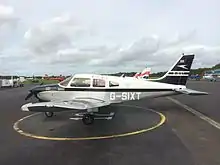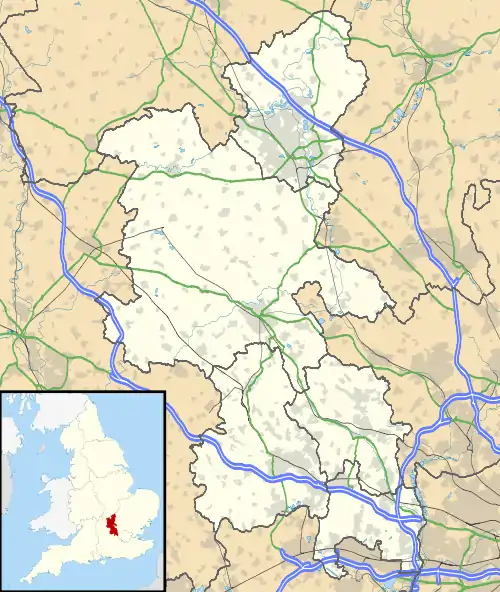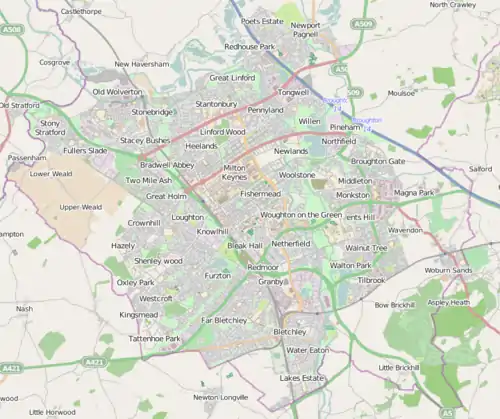Wycombe Air Park
Wycombe Air Park, also known as Booker Airfield (IATA: HYC, ICAO: EGTB), is an operational general aviation aerodrome located in Booker, Buckinghamshire, 2.4 nautical miles (4.4 km; 2.8 mi) south-west of High Wycombe, England. The airfield celebrated its 50th year of opening on 25 April 2015. It originally opened in 1941 as RAF Booker and was primarily involved in training during World War II, remaining a military establishment until 1965.
Wycombe Air Park/Booker Airfield | |||||||||||||||||||
|---|---|---|---|---|---|---|---|---|---|---|---|---|---|---|---|---|---|---|---|
 | |||||||||||||||||||
| Summary | |||||||||||||||||||
| Airport type | Public | ||||||||||||||||||
| Owner | Wycombe District Council | ||||||||||||||||||
| Operator | Airways Aero Association Ltd | ||||||||||||||||||
| Serves | High Wycombe and Marlow | ||||||||||||||||||
| Location | High Wycombe, Buckinghamshire, England | ||||||||||||||||||
| Elevation AMSL | 520 ft / 158 m | ||||||||||||||||||
| Coordinates | 51°36′42″N 000°48′30″W | ||||||||||||||||||
| Website | www | ||||||||||||||||||
| Map | |||||||||||||||||||
 EGTB Location in Buckinghamshire | |||||||||||||||||||
| Runways | |||||||||||||||||||
| |||||||||||||||||||
Wycombe Air Park (Booker Airport) has a CAA Ordinary Licence (Number P523) that allows flights for the public transport of passengers or for flying instruction as authorised by the licensee (Airways Aero Associations Limited).[2]
It has over 90,000 movements per annum, many of which are training circuits over the local area. The films Those Magnificent Men in their Flying Machines, along with Aces High were filmed here.
British European Aviation (majority owned by the Brown family) renewed its lease with WDC for 50 years with its group company AAA in 2014.
Since then over £500,000 has been invested in making the airfield a premier GA destination including hosting the Aero Expo and Elite London show.
Use of the aerodrome
The lease on the aerodrome is held by Airways Aero Associations, who run Booker Aviation from the airfield.[3] They provide air ground control services, aerodrome firefighting and various other services to the air park users as part of provision of a licensed airfield. The shareholding of AAA Ltd was sold in early 2014 to Heli Air.
Fixed Based Operators
Wycombe Air Park is home to a number of FBOs, providing flight training, aircraft maintenance and servicing, and pilot medical examination. Flight training organisations: Booker Aviation.[4]
Heli Air Limited is the primary helicopter flight training school, charter operator, helicopter maintenance provider and Robinson Helicopter sales distributor, based on airfield.
Wycombe Air Park is also home to British European Aviation, the exclusive Piper Aircraft dealer for UK, Ireland, Channel Islands, Spain and Portugal.
Booker Gliding Club is an association for qualified glider pilots and for training glider pilots. It employs professional instructors and it operates seven days a week operation throughout the season. During the Covid19 pandemic it transferred its oerations to Chiltern Park Aerodrome. Owns a fleet of gliders (Schleicher ASK 13, two Schleicher ASK 21, Schempp-Hirth Duo Discus, Slingsby T.21, SZD-51 Junior, Centrair Pegase, Schleicher ASW 19, Scheibe Falke) and three tow planes.[5]
Engineering and avionics: Airways Aero Associations Engineering, Air Training Services and Heli Air.
Future of the aerodrome
The Air Park site is owned by Wycombe District Council, who have leased it to AAA for aviation use until September 2066.
Regulation and environment
The UK Department for Transport (DfT) has suggested that it is minded to specify the Air Park under Section 5 of the Civil Aviation Act, unless a local solution can be achieved through the renegotiation of the lease.[6] This follows an application made to the Secretary of State for Transport in 2009.[7] If the Air Park is specified, the British Civil Aviation Authority will play a more direct role in regulating the environmental impact of air traffic at Wycombe Air Park. The DfT's consideration of a Section 5 order is in response to continuing complaints about noise from training aircraft based at the airfield. Wycombe District Council supported the request for the Section 5 order.[8]
An earlier request for a section 5 order was made by Wycombe District Council in 1988, but was turned down in favour of an expert Inquiry to identify ways in which the Air Park could improve. The whole process including the decision not to specify and the subsequent inquiry ran from 1988–1990, and resulted in the O'Connor report in 1991.
References
- Wycombe Air Park/Booker - EGTB
- Civil Aviation Authority Aerodrome Ordinary Licences Archived 28 June 2007 at the Wayback Machine
- "Booker Aviation". Retrieved 16 February 2016.
- "Flying Training Organisations". Retrieved 16 February 2016.
- "Booker Gliding Club web-site". Retrieved 20 September 2020.
- "AirportWatch - Theresa Villiers finds in favour of Wycombe Air Park Action Group to "specify" the airfield".
- "Campaigners ask government to take control of air traffic at Wycombe Air Park".
- "Updated: air park residents "not at fault" council says".
External links
- Booker Gliding Club
- Booker Aviation
- Wycombe Air Park
- EGTB webcams
- WAP aircraft poster the original of which can be seen hanging at the Airways Flying Club
